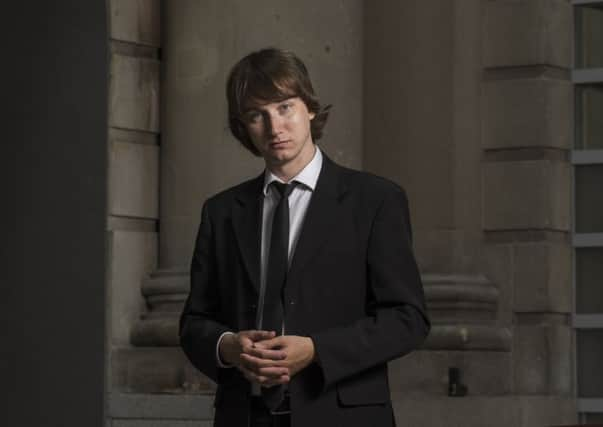Ones to Watch in 2019: Maxim Emelyanychev, conductor


‘There is definitely something in the air”, insists 30-year-old Russian conductor Maxim Emelyanychev. He’s referring to the buzz he has sensed from Edinburgh and Glasgow audiences on the few occasions he has performed as principal conductor-elect of the Scottish Chamber Orchestra.
By September this year he will be properly installed in the post, and we will be in a position to fully understand why the SCO players are so excited about his appointment. According to principal cello Philip Higham: “There was a feeling in our concerts with him of the perfect ‘trialogue’ between composer, conductor and orchestra.” Chief executive Gavin Reid is equally impressed: “For a conductor to create such an extraordinary connection with a new orchestra so quickly was quite astonishing.”
Advertisement
Hide AdDetails of Emelyanychev’s first official SCO season will not be released until March, but I caught up with him early to learn a bit more about what makes this young, relatively unknown appointee tick, and what he hopes to achieve with the SCO.
Emelyanychev lives in Moscow, but was born and raised 400 miles to the east in Russia’s fifth largest city, Nizhny Novgorod, which sits on the confluence of the Volga and Oka rivers. His father was a trumpet player. By the age of 12, Emelyanychev had conducted his first orchestra. After training at the city’s boy’s choir and local music college, he headed to the capital for five years of intensive study at the famous Moscow Conservatory, where his mentor was Gennady Rozhdestvensky.
Was conducting always his main ambition? Coming from a musical family, he’d certainly been around orchestras from the age of three. “It was no question for me,” he says. “I didn’t see any different possibility.”
He adds: “In Soviet times many, many interesting things took place where I grew up. It was kind of closed to people outside of the country, and there were many interesting contemporary music festivals. Many pieces by Alfred Schnittke, whose music was forbidden in Moscow, were played there by the Nizhny Novgorod Philharmonic. Rostropovich made his conducting debut in the city.”
While he is too young to have experienced that personally, he clearly feels an affinity with the city’s rich musical legacy.
Nowadays, his conducting commitments take him back and forth from Russia. He is principal conductor of the Zurich-based Il Pomo d’ora Orchestra, which specialises in authentic Baroque and Classical performance. With them he won a 2017 Gramophone Award for War and Peace, an album featuring Baroque operatic arias sung by the wonderful American mezzo soprano Joyce DiDonato, and directed by Emelyanychev from the harpsichord. They will tour War and Peace around China later this month, and collaborate again in May in a European tour of Handel’s Agrippina. He’ll be back in the UK later this year to conduct more Handel opera with the Orchestra of the Age of Enlightenment.
Advertisement
Hide AdBy then, of course, Emelyanychev will be firmly in post with the SCO, and his first season will be under way. He’s expecting to conduct around five weeks per season, but what kind of repertoire can we expect from him when he is here, and what nature of relationship will he establish with the players?
“I like very much what the SCO does to include period instruments, and I will continue to do projects like that,” he reveals. For this, he says, we can expect to see him directing from the keyboard – “the harpsichord if its Baroque, but also the piano if it’s a concerto by Mozart or Beethoven”.
Advertisement
Hide AdHe adds: “I also like the fact that we can always invite in extra instruments – trombones, drums, more strings – so we can actually perform music from any century. I want to play some chamber music programmes together with the players as well.”
Such broad-ranging involvement matches up to Emelyanychev’s belief that a good conductor must know about the practicalities faced by the musicians under his care. “The conductor has to know the instruments much better than them,” he maintains.
“Take the clarinet, for instance. In the last 80 years the look of it has remained the same – same keys, same basic measurements. But inside, there’s been a big revolution in the way it is made. Technology has changed the nature of mouthpieces, and certain measurements have altered due to the combining of French and German clarinets. It’s helpful to know these details when you’re asking a player to perform in a certain way.”
It’s a two-way process, though, and as someone used to working with similar-sized orchestras elsewhere, Emelyanychev is in no doubt there will be a mutual dialogue with the SCO. “What I want for the interpretation of any music is a co-operation of different ideas,” he explains. “If there’s a solo for clarinet or bassoon, for example, it’s much better to give freedom to that soloist. The freer they are, the better they play. My role is to co-ordinate these ideas into a unique interpretation.”
The SCO’s 2019/20 programme will be announced in the spring, www.sco.org.uk